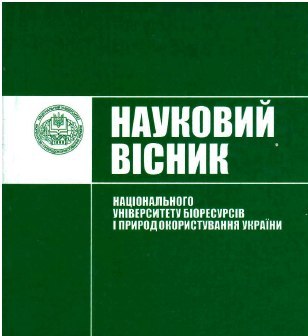Systematic сharacter of the plants as a constituent of the international botanical nomenclature and a standardization prototype
DOI:
https://doi.org/10.31548/philolog0(263).2017.074%20-%2081Abstract
Current globalization processes extremely impact not only external and internal economy of the states at any level of their development and gross national product, but also are reflected in direct proportion in the mechanisms of social and economic policy in general, the ways of environmental management and sustainable development; they are the indicators of common values and relations transformation at all stages of scientific development. Every cultured person needs to know at least in general terms how the world works, how laws of nature "function" in it. Human’s understanding of reality is based on the perception of scientific worldview, which makes it possible to adequately analyze the information and be more prudent in making critical decisions about the surrounding reality.
Scientific terminology is viewed as an integral functional system that helps form images of perception, and decrypt language codes. When defining the term as a part of terminological matrix according to knowledge areas, the authors go deep into the issue of standardization prototype appearance, presented by the systematics of plant kingdom. Thus, they prove that the existing terminological standards at national and international levels have not emerged by themselves, they have been gradually formed in the data banks for many centuries, unifying the then ideas about flora. In such a way, the plant systematics occurred on the scientific arena, which task was to describe and designate all the existing and extinct organisms and classify them according to different ranks. The gradual formation of theoretical approaches for standardization the terminological system took place.
As Charles Bally aptly put it, words never exist independently, and the new word must face with synonyms. Synonymy, existing in Latin names of plants families, is a rare phenomenon. Although, based on the term definition, synonymy is undesirable for any modern terminology, the analysis of the origin and functioning of current botanical terms shows that this semantic process is not only being developed but is also seen as a features qualifier of modern terms. There is no point in denying synonymy as its manifestations are present at both syntagmatics level (when each of the term options is perceived in a particular speech act), and at paradigmatics level (when we talk about the term system as a whole). The terms «systematic», «classification» and «taxonomy» in the scientific speech are used as synonyms: taxonomy develops the theoretical basis of organisms classification, and systematics designates and describes the ordered and classified biological objects, and creates their systems on this basis.
References
Moʻatsah ha-madaʻit le-Yiśraʼel? (1960). Weizmann Science Press of Israel., Bulletin: Geo-sciences. Available at :
https://books.google.com.ua/books?hl=uk&id=X2UPAAAAIAAJ&dq
Balalajeva, O. Ju., Vakulyk, I. I. (2013). Latynsʹka mova ta osnovy biolohičnoji systematyky [Latin systematics and foundations]. Kiev: Fitosociocentr, 2013, 324.
Vakulyk, I. I. (2012). Naukove myslennja ta joho vplyv na stanovlennja naukovoji kartyny svitu [Scientific thinking and its influence on the formation of a scientific world]. Visnyk Dnipropetrovsʹkoho universytetu imeni Alʹfreda Nobelja, Vyp. 3, 145-154.
Vakulyk, I. I. (2015). Robota nad terminolohijeju i faxova mova [Work on terminology and language for specific purposes]. Naukovyj visnyk NUBiP, Č. 1. Serija «Filolohični nauky», 303-307.
Vakulyk, I. I. (2015). Systemnist u vyvchenni latynskoi movy na shliakhu formuvannia suchasnykh universalnykh znan [Consistency in learning the latin language on the way to the formation of present pansophy]. Bulletin of National University of Life and Environmental Sciences of Ukraine. Philology, 215, 1, 159-166.
Vakulyk, I. I. (2015). Linhvistyčni aspekty naukovoji komunikaciji u synxroniji ta diaxroniji [Linguistic aspects of scientific communication in synchrony and diachronic]. Print Servis, 280.
Korsun, V. I., Bjelan V. T., Hluxova N. V. (2011). Metrolohija, standartyzacija, sertyfikacija, akredytacija [Metrology, standardization, certification, accreditation]. Donets'k : Nacionalʹnyj hirnyčyj universytet, 147.
Poljakova, N. O. (2015). Metrolohija i standartyzacija [Metrology and Standardization]. Fitosociocentr, 214.
Tkach, A., Shynkaruk, V. D. (2010). Slovotvirna identychnist ukrainskoi terminolohii [Word-forming Identity of the Ukrainian Terminology]. Chernivtsi: ChNU, 196.
Tulku, T. (1994). is Time, space and knowledge. New vision of reality. Available at:http://www.ereading.club/bookreader.php/112160/Tulku_Tartang_Vremya_prostranstvo_I_znanie.html
Xarčenko, S. V. (2013). Problemni aspekty funkcionuvannja nacionalʹnyx standartiv seriji «Informacija ta dokumentacija» [Outstanding aspects of the national standards of the series «Information and documentation»] Bibliotekoznavstvo. Dokumentoznavstvo. Informolohija, 1, 8–16.
Downloads
Published
Issue
Section
License
Relationship between right holders and users shall be governed by the terms of the license Creative Commons Attribution – non-commercial – Distribution On Same Conditions 4.0 international (CC BY-NC-SA 4.0):https://creativecommons.org/licenses/by-nc-sa/4.0/deed.uk
Authors who publish with this journal agree to the following terms:
- Authors retain copyright and grant the journal right of first publication with the work simultaneously licensed under a Creative Commons Attribution License that allows others to share the work with an acknowledgement of the work's authorship and initial publication in this journal.
- Authors are able to enter into separate, additional contractual arrangements for the non-exclusive distribution of the journal's published version of the work (e.g., post it to an institutional repository or publish it in a book), with an acknowledgement of its initial publication in this journal.
- Authors are permitted and encouraged to post their work online (e.g., in institutional repositories or on their website) prior to and during the submission process, as it can lead to productive exchanges, as well as earlier and greater citation of published work (See The Effect of Open Access).

